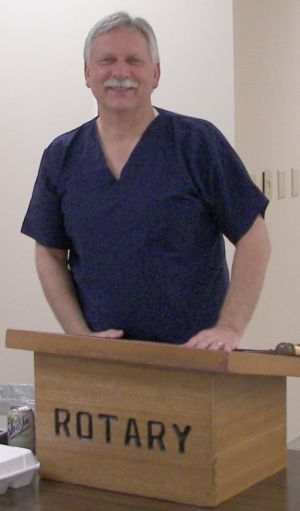|
Recently it was our pleasure to have They have a new office going in across from the Q: Don't the people of The condition is called "Sleep Apnea" which means "sleep without air". It is usually caused by an obstruction in the airway, and then called "Obstructive Sleep Apnea". Two major problems: Quality of Life (person snores while spouse can't sleep, and then the snorer falls asleep at work!), and it is a major contributor to high blood pressure, cardiac problems, abnormal heart rhythms, heart attack, heart failure, increased insulin resistance (even non-diabetic patients), stroke, increased traffic and workplace accidents, memory problems, and the ability to think correctly. These are just a few - and relatively major problems. With Sleep Apnea, the longer it goes on, the more damage it does - like getting a cavity in your tooth. Most patients won't come to get a test until they can't sleep and they're having major problems - and for the last 10-20 years! Can it cause death? Well, in the case of auto accidents, most certainly. Reggie White, a famous football athlete, recently died of Sleep Apnea (proven through the autopsy). He died in his sleep from a lack of oxygen, and this was a fit, otherwise healthy person. Mr. With these conditions (an "apneic event"), it is a cycle of events: Your airway collapses, your oxygen level drops, your heart changes rate rapidly, your brain sends out an alarm to wake up and breathe, your sleep is interrupted as you awake and gasp for air, you go back to sleep, your airway collapses, and we're back to the beginning. Again, most patients don't even know they have a problem. Most get referred by their spouse for snoring. During a sleep test, we measure the apneic events. We have an apnea/hypopnea index that refers to a measurement on an hourly basis of how many of these events a person has. We all have hypopneas and apneas during the night. About 0-5 per hour is a norm. 5-15 is mild. 15-40 is moderate, and over 40 is severe. Our test shows the person's AHI. Here is a patient that had 110 per hour [a graphic is shown]. During a sleep test, many "leads" or electrodes are placed on the patient. The "tracing" or "epic", as it is called, is a chart or graph similar to an EKG or EEG that measures brain waves on 4 channels, sleep stages (1, 2, non-REM sleep, REM sleep, etc.), right and left eye nerves, chin nerve (or leg), snoring, heart rate (2 channels), pulse, airflow (volume) on two channels, lung expansion and contraction, CO2 levels, body position, etc. Q: We asked why the chin is monitored. The chin is monitored for muscle tone. As you sleep, your muscles relax and you lose muscle tone. In REM sleep, The leg can also be monitored instead of the chin. Mr. He also showed us that position matters as well. A person sleeping on their back may exacerbate problems as opposed to on their side. Also, a person having apneas during the REM sleep stage as opposed to other stages/times caused more daytime sleepiness because REM sleep is more restorative to the mind than other stages. Lastly, there is a new type of apnea called "Complex Sleep Apnea", which is a combination of an abnormal mix of air in their lungs and the brain doesn't think it has to breathe, which can only be treated with an "Auto-SV" machine which allows for "servo-ventilation". We are one of the few labs in Also, a new screening device is out, that can be sent home with the patient (possibly for no charge), that is very small (about the size of a credit card), and clips on a shirt, that measures airflow and other things. Then, if apneas show up, the person can be brought in for a full sleep test. We may be able to do home sleep testing as well in the future. We are trying to get as many people tested as possible for the lowest cost. (***NOTE: All this is subject to insurance. Please check with the Star Valley Medical Center Sleep Lab for details.) Q: Are there any foods or supplements that help apneas? Well, not eating before bed helps considerably because gastric/digestive juices can cause Gastric Reflux is a major cause. Exercise and diet can help raise blood flow and lower obesity. There are also no prescription drugs that help. Only sleep position, surgery, or the CPAP machine(s) can help this condition. |

